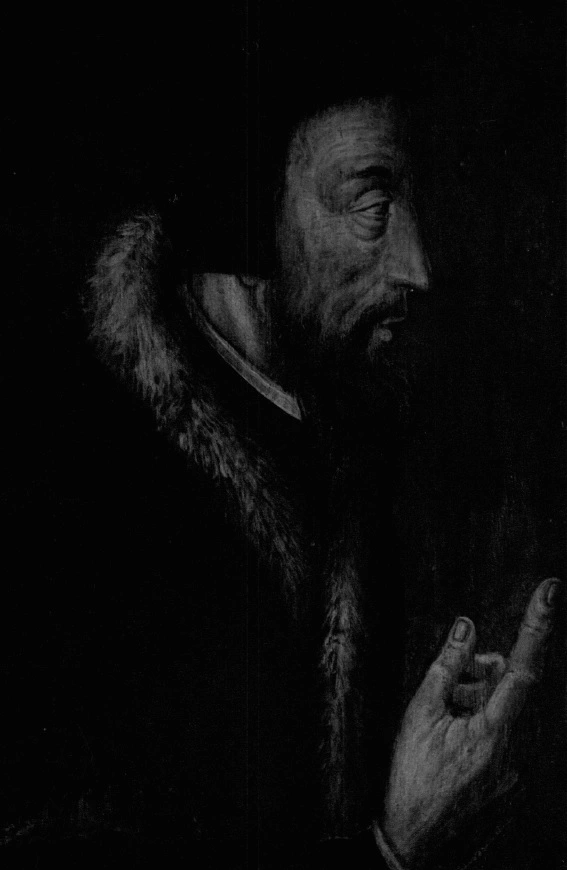John Calvin
Publié le 22/02/2012
Extrait du document

Calvin, John (1509–1564) one of the most important
leaders of the Protestant REFORMATION Calvin
was born and educated in France. His father, a lawyer,
had the young Calvin prepare fi rst for a career in the
church, then for one in law. When his father died
in 1531, Calvin turned from law to humanism, that
is, to the study of the classics of ancient Greece and
Rome. In 1533 one of Calvin's close friends gave an
address, at the University of Paris, which supported
some ideas of Martin LUTHER. The theologians of
Paris had earlier condemned these ideas. The friend
had to fl ee for his life. Calvin was implicated in his
friend's views, and he had to fl ee, too. Around this
time Calvin seems to have had a profound personal
religious experience.
In 1536 Calvin settled in Geneva, Switzerland.
With the exception of three years spent in Strasbourg
(1538–41), he spent the rest of his life in
Geneva. At fi rst he assisted the Reformation there.
Eventually he led it.
Calvin organized Geneva's government, church,
and schools. In his eyes, the government and the
church needed to cooperate to ensure that the ideals
of the BIBLE were observed. As a result, Geneva
John Calvin (Library of Congress) became a place where Christian regulations were
strictly enforced. The infl exibility of the views was
not unusual at the time, but it did have unfortunate
consequences. The most famous example is
the case of Michael Servetus, who was burned at
the stake in 1553 for teaching that GOD is one, not
a TRINITY.
Calvin made his mark as a writer, a thinker,
and an organizer. His many writings include a catechism,
sermons, hymns, commentaries on the
Bible, and letters. But his most important book is
Institutes of the Christian Religion, fi rst published
in 1536. Throughout his life Calvin revised and
expanded it. He published the last version in 1559.
As a humanist, Calvin insisted on returning to
the original sources. In THEOLOGY, that meant the
Bible. His reading of the Bible owes a great deal to
the thought of the apostle PAUL and AUGUSTINE OF
HIPPO. Calvin emphasizes that, as a result of original
SIN, human beings cannot live in the state for
which they were created: communion with God.
Nevertheless, God redeems sinners, although they
do not in any way deserve to be saved. But God
chooses to save some sinners and to condemn others
to hell. This is Calvin's famous teaching of predestination.
God saves people through the activity
of JESUS, the prophet, priest, and king. He also does
so through the Holy Spirit, who instills faith in the
human heart.
Calvin recognized four offi ces in the church:
pastors, who preached and administered the SACRAMENTS
of BAPTISM and EUCHARIST; teachers, who
instructed in faith; elders, who administered and
ensured discipline; and deacons, who assisted the
poor. The congregation was governed by a "consistory,"
a body made up of pastors and elders.
On some points Calvin differed from Martin
Luther. One of the most signifi cant was the interpretation
of the eucharist. Luther had insisted that
Jesus's body and blood were actually present in
the bread and wine of the eucharist. Calvin taught
that they were present spiritually. As a result, the
Reformation gave rise to several distinct traditions.
Calvinism is one of the most important. Calvinist
churches are known as "Reformed" (see PRESBYTERIAN
AND REFORMED CHURCHES). They predominate in
Switzerland, the Netherlands, and Scotland. In the
United States Calvinism is represented above all by
the Presbyterian Church, which derives from the
Scottish Calvinist tradition.
Liens utiles
- Calvin, John
- Coolidge, John Calvin
- Calvin John COOLIDGE
- John Calvin Coolidge
- Martin Luther, Calvin, John Donne et Johannes Eckart































